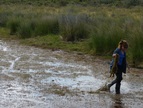|
By Julie F. Charbonnier
When researching a new topic, you may one day come across a literature review. Or, perhaps you will need to write your own review, as part of a senior thesis project or as a chapter of your dissertation. Either way, you can use literature reviews as an important tool for understanding the research in an unfamiliar field and for developing your own writing skills. What is a literature review? A literature review is a summary of the current, scientific literature on a particular topic or a specialized critique of an individual article. Literature reviews require you to find, collect, and organize past studies on a scientific topic or question. With this background material in hand, you will identify the emerging ideas in a very specific area, as well as important theories and questions that still need to be answered.
Why should I write a literature review? There are hundreds of studies being published every week, and scientists are inundated by a deluge of information. A review is a great way to immerse yourself in the literature and gain valuable research skills without having to first collect data. Scientists typically publish the results of individual studies in peer-reviewed journals (the primary literature), where articles are independently evaluated by other scientists in the field. Because literature reviews often encompass multiple studies, they allow you to step back and take in an overview of the important work in a given area. Since literature reviews provide the history of a given field, you can use them to become more familiar with a new field of research and determine how your research can build upon a previous foundation. How can literature reviews help to develop my writing skills? Writing a review will require you to search the literature, to read and determine the relevance of scientific articles, and to organize previous research in the field, while communicating your own ideas. This process will require you to identify relevant keywords for your literature search and sift through the current literature, making you more proficient at "skimming" scientific articles and understanding complex research topics. Once you have the articles, you will need to interpret the results for yourself and evaluate the conclusions the authors make, improving your ability to discern a high-quality paper from a weak one. Finally, you will have to integrate the information and find points of coherence. Many of these skills are also highly transferable to non-academic careers. The ability to gather and systematically organize information and effectively synthesize this data into a coherent whole will increase your employability in any field. For example, in an industry position you may have to analyze large amounts of company or customer data and identify the key points of interest. By writing a literature review, you will also improve your editing skills, enabling you to refine your written communication skills. Your literature review will be a valuable writing sample that you can present to potential employers and discuss during interviews for your entire career. Now that you want to write a literature review, do you need to know how? Julie Charbonnier also wrote "How to write a literature review". Find it here! 
About the Author
Julie F. Charbonnier is a 4th-year PhD candidate in Integrative Life Sciences at Virginia Commonwealth University. Her research focuses on amphibian and population ecology. She is also interested in scientific writing and science policy. You can follow Julie on Twitter @modernecologist Comments? Leave them below! ].com/" data-width="630" data-num-posts="10">
0 Comments
Your comment will be posted after it is approved.
Leave a Reply. |
Education BlogAbout ScientistaSubscribe!NEW!New PostsWhat's HotClick to set custom HTML
You Might Like...
Connect With UsLatest tweets |
The Scientista Foundation, Inc. All Rights Reserved © 2011-2021 | Based in NY | contact@scientistafoundation.org
The Network for Pre-Professional Women in Science and Engineering
The Scientista Foundation is a registered 501(c)(3) -- Donate!
The Network for Pre-Professional Women in Science and Engineering
The Scientista Foundation is a registered 501(c)(3) -- Donate!


 RSS Feed
RSS Feed









